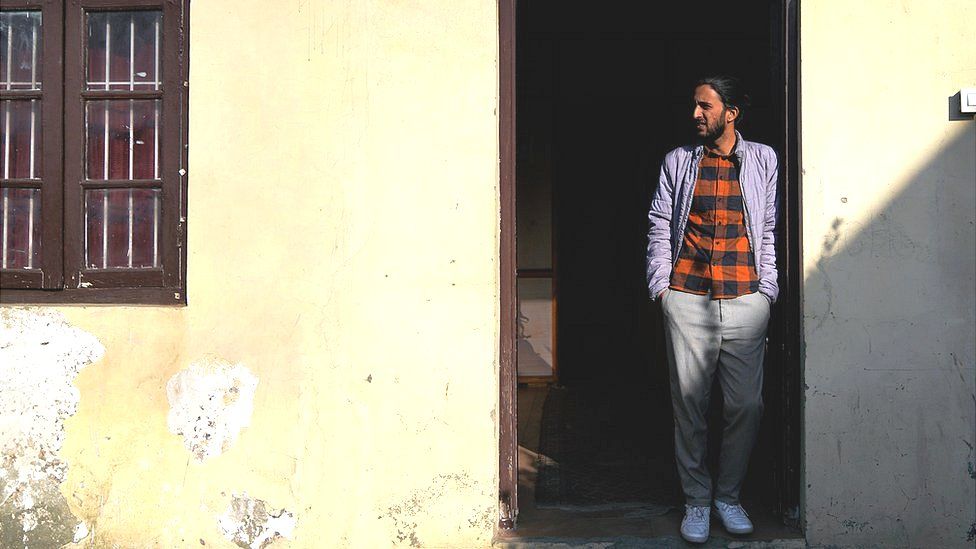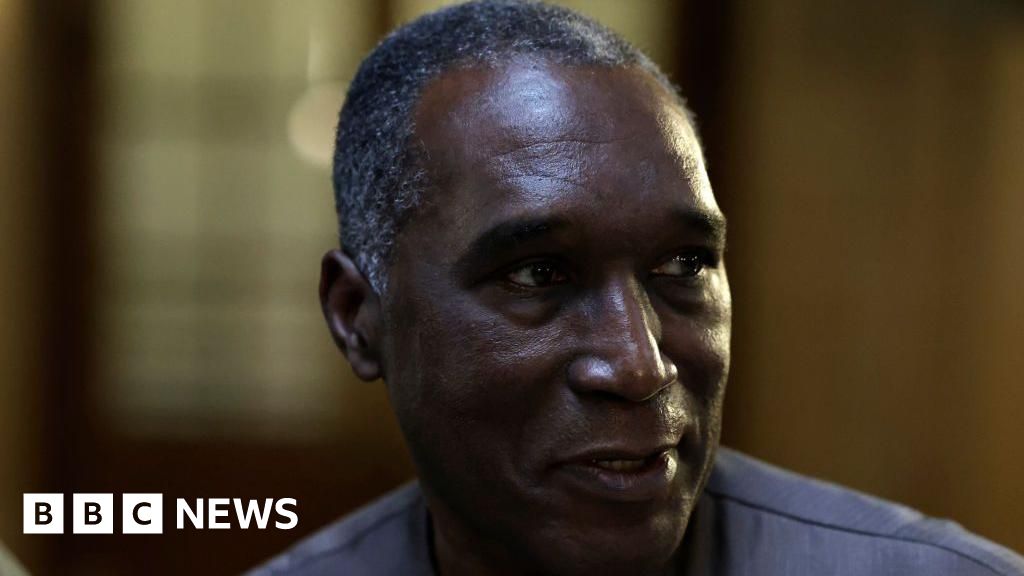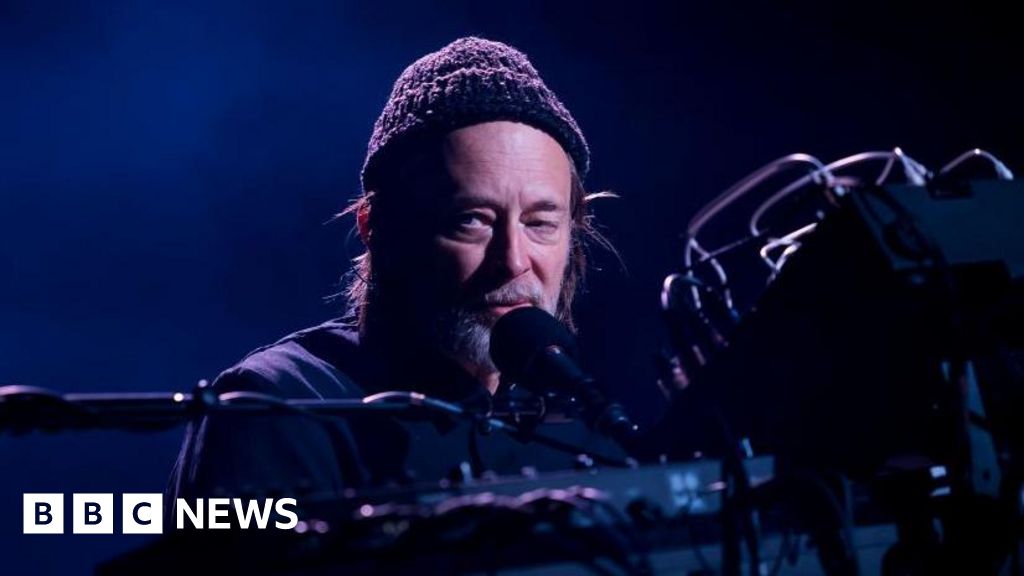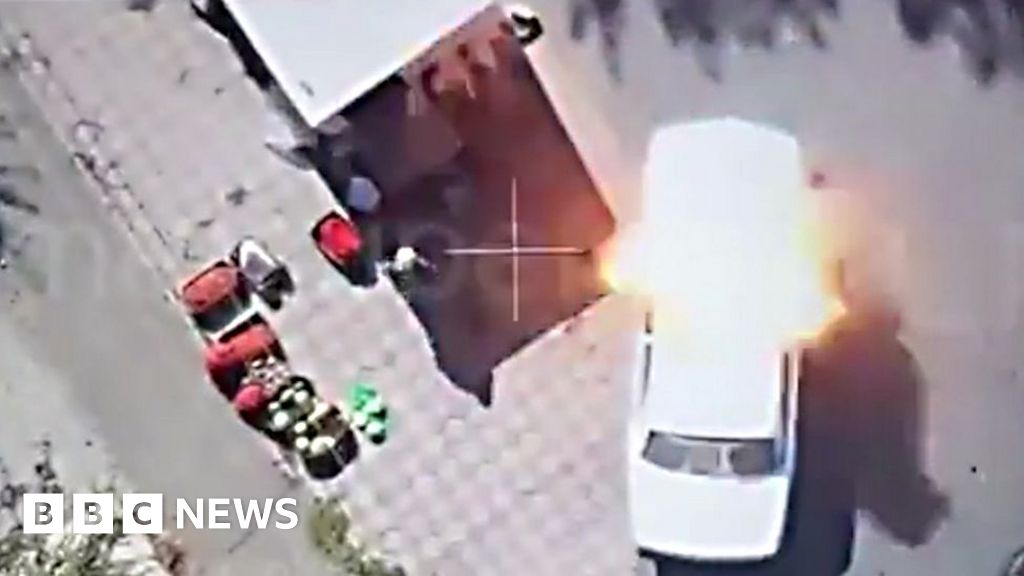ARTICLE AD BOX
 Image source, Mukhtar Zahoor
Image source, Mukhtar Zahoor
Journalist and digital magazine editor Fahad Shah has been arrested and granted bail several times
By Yogita Limaye
BBC News, Srinagar
On 5 April 2022 a sense of joy pervaded the Sultan household in Batamaloo in central Srinagar.
It was a sunny spring day in Indian-administered Kashmir, and after more than three and a half years of visits to courts and police stations, they had received good news - Asif Sultan, a journalist, husband, father and son, had been granted bail.
Relatives gathered waiting for him to return home. When hours turned to days, Asif's family began to get anxious.
On 10 April, another charge was brought against Asif. He wasn't released and was moved to a jail outside Kashmir, making visits difficult.
"We are devastated but will keep fighting in court. Everyone knows he's innocent so we will win eventually," his father Mohammad Sultan said. His five-year-old granddaughter Areeba ran into the room and sat on his lap - she was six months old when her father was arrested.
Image source, Getty Images
Image caption,Mohammad Sultan believes his son Asif (pictured here in 2018) was targeted for his work
Asif Sultan was first charged with aiding militancy in Muslim-majority Kashmir, which has seen an armed insurgency against Indian rule since 1989.
He is charged under an anti-terror law called the Unlawful Activities Prevention Act (UAPA) in which it's extremely difficult to get bail. The second charge against him is under another controversial law - the Public Safety Act (PSA) - which allows detention without charge for up to two years.
Mohammad Sultan rejects the accusations. He believes Asif was targeted for his work, in particular an article about an anti-India militant that Asif wrote a month before he was arrested in August 2018.
"Asif is a professional reporter and he has been jailed for writing about the militancy. He has nothing to do with them [militants]," says his father. "They [the government] wanted to make an example out of him so that no one dares to cover topics the government doesn't approve of."
The BBC has spent more than a year investigating accusations against the Indian government that it is running a sinister and systematic campaign to intimidate and silence the press in the region. We had to meet journalists in secret, and they asked for their names to be hidden, fearing reprisals.
Over many trips we spoke to more than two dozen journalists - editors, reporters and photojournalists working independently as well as for regional and national outlets - all of whom see the government's actions as a warning to them.
Asif has now spent five years in jail. Since 2017, at least seven other Kashmiri journalists have been jailed. Four, including Asif, are still behind bars.
Image source, Umer Asif
Image caption,Fahad Shah was accused of "propagating terror" and arrested under India's anti-terror laws
Fahad Shah, who edited a digital magazine, was arrested under anti-terror laws in February 2022, accused of "propagating terror".
A month before him, freelance journalist Sajad Gul was arrested soon after he posted a video on social media of locals shouting anti-India slogans. Sajad was charged with criminal conspiracy. Both have been re-arrested under new charges, each time they have been granted bail.
The latest journalist arrest was in March this year. Irfan Meraj, whose work has appeared in international outlets, is accused of having links with terror funding.
Many others from the press have had cases registered against them.
The BBC has repeatedly asked the regional administration and police to respond to the allegations against them. We have sought interviews and also sent emails with specific questions. We have not received a reply.
At the G20 meeting in Srinagar in May we asked Manoj Sinha, the region's top administrator, about allegations of a media crackdown. He said the press "enjoys absolute freedom". Journalists were "detained and arrested on terror charges and for attempts to disrupt social harmony, not for journalism or for writing stories," he said.
We have heard multiple accounts which belie the claims.
"It's very common for a journalist to be summoned by the police here. And dozens of instances where reporters have been detained over their news reports," one reporter told me.
"I started getting calls from the police about a story I did. They kept asking why I'd done it. Then I was questioned in person. They said they know everything about me and my family which was very scary. I kept thinking about whether I would be arrested or harmed physically."
More than 90% of the journalists I spoke to said they had been summoned by the police at least once, many of them multiple times over a story. Some said the tone of the police was polite. Others said they were met with anger and threats.
"We live in fear that any story could be our last story. And then you'd be in jail," one journalist said.
"Journalism is dead and buried in Kashmir," another reporter told me.
Each of the journalists I spoke to said they had been called by the police numerous times over the past few years for "routine background checks".
I was witness to one such phone call.
The journalist I was with got a call from the local police station. They put their phone on speaker. The police officer introduced himself and asked the journalist their name, address and where they worked.
When the journalist asked why these details were needed, the officer's tone remained friendly but he proceeded to read out details of the journalist and their family, including what their parents do, where they live, where their siblings study and work, what degrees their siblings have and the name of the business that one of their siblings runs.
I asked the journalist how they felt after that call.
'It's worrying," they said. "I'm thinking now are they watching me, are they watching my family, what triggered this phone call and what's going to happen next?"
Journalists in Srinagar told the BBC it is common for them to be summoned by police for questioning
Other journalists said they have been asked even more personal details including what property they own, what bank accounts they have, what their religious and political beliefs are.
"Journalists in Kashmir are being treated like criminals. We're labelled as anti-nationals, terror sympathisers, and pro-Pakistan reporters. They don't understand that it's our job to reflect all sides," one journalist said.
All of the Kashmir region is disputed by India and Pakistan, and both countries as well as China control parts of it. Militant groups operating in Indian-administered Kashmir are based in Pakistan and are long believed to have the support of Pakistan's intelligence services, an allegation Islamabad firmly rejects.
There have also long been accusations of human rights violations by Indian security forces in Kashmir, which have fuelled anger against Indian rule and support for pro-Pakistan insurgent groups in some parts of the region.
Journalists say the Indian government is trying to shut down reporting related to separatist movements and militant groups, but also any coverage critical of the security forces or the administration, even on day-to-day civic issues.
Most journalists I spoke to said they began to feel more scrutiny after Asif Sultan's arrest in 2018, and things have become drastically more difficult since August 2019. That's when India revoked the region's special status and divided the country's only Muslim majority state into two territories which are now controlled by the national government led by the Hindu nationalist Bharatiya Janata Party (BJP). The Supreme Court of India is currently hearing a case about the legality of these moves.
For five years now, there has been no elected regional government here. And when the chief justice asked the government this week when elections would be held, noting that "restoration of democracy is important", the government said it could not give an exact timeline.
"Because there's no elected representative we can approach, the government gets away with acting with impunity," a journalist said.
At least four Kashmiri journalists have made public that they were stopped from flying out of India, their boarding passes stamped "cancelled" by immigration authorities with no reasons given. One is a Pulitzer Prize-winning photographer who couldn't attend the awards ceremony.
The BBC has learnt that the list of Kashmiri journalists not allowed to leave India has dozens of names, but it's not been made public. We asked the police about the legal basis for these "look out circulars", as they are referred to in official parlance, and have not received a reply.
Journalists have also had fresh passports withheld when they applied to renew expired passports. In recent weeks, passports previously issued to some journalists have also been cancelled. Communication from the government says the journalists are considered a "security threat" to India.
"We feel choked and suffocated," one journalist said. "All of us are self-censoring. I read my report once as a journalist, then I read it like a policeman would and I start deleting things and watering it down. There's hardly any journalism being done, it's mostly just PR for the government."
Editors have told us they often get directions from the administration on what to cover and what to leave out. They have been instructed to use the word "terrorist" instead of "militant" when referring to armed insurgents.
Regional media outlets depend heavily on government advertising and many have been threatened with the withdrawal of these funds if they don't fall in line.
"I hate what I do every day, but what about the people I employ? What happens to them if I shut down?" one editor said.
What's happened to journalism here is evident when you read the local press.
I spent three days comparing dozens of papers published in Kashmir with the daily government press release.
Nearly all had the release on their front pages, some had edited it, others carried it verbatim.
The rest of the front pages were covered with statements from the government or security forces. There were many feature stories but barely any journalism holding the government to account.
In June, allegations surfaced of Indian army personnel entering a mosque in Pulwama in southern Kashmir and shouting "Jai Shri Ram" (Hail Lord Ram), a Hindu chant.
In normal circumstances, journalists from all outlets would have been in Pulwama speaking to all sides on the ground to verify details and filing reports.
The day after, only a handful of papers carried the story, nearly all reporting it through a quote from regional politician Mehbooba Mufti, who called for an investigation.
Image source, Mukhtar Zahoor
Image caption,Journalists the BBC spoke to voiced fears of both militants and the Indian state
Over the next few days, more papers carried it, but only as a story about the Indian army investigating the incident. There was barely any on-the-ground reporting.
While most journalists I spoke to said they fear reprisals by the state, some also said they feel under threat from militants.
There have been instances of militant groups posting statements on their websites threatening journalists.
I spoke to one journalist who received a threat.
"A journalist's life in Kashmir is like walking on a razor's edge. You live in fear all the time," he said.
What are you afraid of, I asked.
"Of a bullet coming at me. When I see a motorcycle stop next to me, I feel terrified that someone is going to pull out a gun and shoot me, and that no one will ever find out who did it," he said.
In 2018, leading editor Shujaat Bukhari was shot dead outside his Srinagar office, police say by militants. Five years later the trial into his killing is yet to begin.
In a region ridden by conflict, one space where journalists could meet freely, discuss stories and share their anxieties was the Kashmir Press Club in central Srinagar. It was a refuge especially for independent journalists who don't have offices.
But it wasn't just that. It was also the main body in the region that defended the rights and freedom of the press.
The former Kashmir Press Club in central Srinagar, now repurposed as a police office
Last year, the government shut it down. The complex I've visited so often to get invaluable local insight into stories, now houses a police office.
Journalists say they have nowhere to turn to when they feel threatened.
Foreign journalists need Ministry of Home Affairs permission to visit Kashmir, and they are rarely given it. The G20 event in May was the first time in the past few years foreign journalists had been allowed to visit Srinagar, but the access was extremely controlled - defining which areas they could visit and what they could cover.
Over the past decade, all of India has witnessed a serious decline in press freedom, which is reflected in global rankings, cases against journalists and raids against media houses. But the degree of the decline in Kashmir is extreme - we have found evidence that press freedom has been all but eroded here.
In the Sultan household, a copy of Kashmir Narrator, the magazine Asif Sultan used to write for, takes pride of place on a shelf in the living room.
His father opened the well-thumbed magazine and pointed to Asif's photo in a byline. Mohammad asked his granddaughter who the person in the picture was.
"My Papa. He is in jail," Areeba replied.
Mohammad hopes Asif is released before Areeba gets to an age where she registers what has happened to her father.
"I'm getting old," he said. "But I'm trying to be both a father and grandfather to her. How long can I do this for?"

 1 year ago
13
1 year ago
13








 English (US)
English (US)